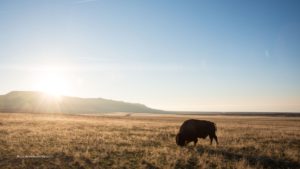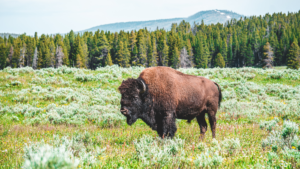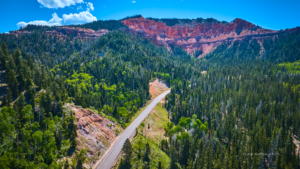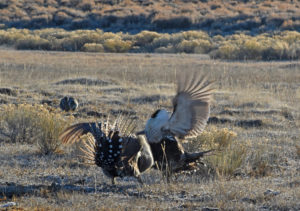For Immediate Release, November 25, 2020
Contact:
Kelly Fuller, Western Watersheds Project, (928) 322-8449, kfuller@westernwatersheds.org
Emily Deanne, Natural Resources Defense Council, (202) 717-8288, edeanne@nrdc.org
Connie Wilbert, Sierra Club, (307) 460-8046, connie.wilbert@sierraclub.org
Cheyenne, Wyo.― This week, five conservation groups filed a formal protest against the Bureau of Land Management’s (BLM’s) proposed designation of roughly 1,100 miles of new pipeline corridors on BLM land. To use the corridors, pipelines would need to cross almost 900 miles more of private and state land. When fully built, the new pipeline system would total nearly 2,000 miles of pipelines across public and private land, slicing through Seedskadee National Wildlife Refuge and other important wildlife habitat, and worsening climate change by increasing oil production.
“This proposal proves that BLM has as little regard for sage-grouse as the oil and gas industry does,” said Kelly Fuller, Energy and Mining Campaign Director at Western Watersheds Project. “To approve this massive new network of pipeline corridors, BLM will strip protection from tens of thousands of acres that BLM’s own sage-grouse plans say pipelines are supposed to avoid. This is how you drive wildlife extinct.”
Current scientific literature assessing the greenhouse gas impacts of enhanced oil recovery (EOR) finds mixed results, not the purely positive climate impact claimed by BLM. While there are arguments for EOR as a way to sequester substantial amounts of carbon, there is also a compelling case against it, namely that it facilitates more production of oil that otherwise would stay safely sequestered underground, thereby making climate change worse. BLM provides no support for its claims that the proposed EOR projects would offer a bridge to a reduced carbon emissions future.
“Amid the twin global crises of the coronavirus and climate change, this lame-duck administration’s rush to enable more fossil fuel projects that would further damage the climate and communities is unacceptable and should be shelved,” said Alison Kelly, senior attorney with Natural Resources Defense Council.
If approved, the proposed pipeline corridors would bisect numerous big game migration routes, displacing mule deer, pronghorn, moose, and bighorn sheep from essential seasonal habitats between summer and winter ranges. Mule deer numbers have declined statewide by more than 30% since the early 1990s, with even steeper declines in southwestern Wyoming. Over a similar timeframe, moose numbers have declined 65%, due in part to habitat alteration or loss.
“The more we learn about big game migration corridors, the more clear it becomes that these migration routes are essential to maintaining healthy and thriving populations of deer, pronghorn, moose, and bighorn sheep,” said Connie Wilbert, Director of Sierra Club Wyoming. “A number of herds are already struggling, and this ill-conceived proposal could drive their numbers ever closer to the brink.”
###
Western Watersheds Project protects and restores western watersheds and wildlife through education, public policy initiatives, and legal advocacy.
NRDC (Natural Resources Defense Council) is an international nonprofit environmental organization with more than 3 million members and online activists. Since 1970, our lawyers, scientists, and other environmental specialists have worked to protect the world’s natural resources, public health, and the environment. NRDC has offices in New York City, Washington, D.C., Los Angeles, San Francisco, Chicago, Bozeman, MT, and Beijing. Visit us at www.nrdc.org and follow us on Twitter @NRDC.
#






